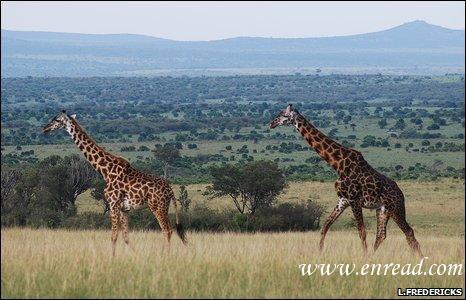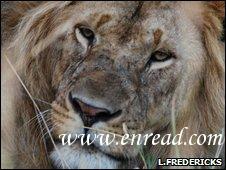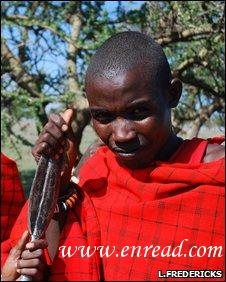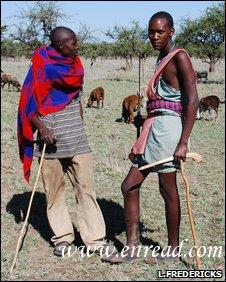| ||||||||||||||||||||||||||||||||||||||||||||||||||||||||||||||||||||||||||||||||||||||||||||||||||||||||||||||||||||||||||||||||||||||||||||||||||||||||||||||||
|
Wild grazing animals in Kenya's Masai Mara National Reserve are steadily1 disappearing, a study has found. 研究发现,肯尼亚马赛国家保护区的野生食草动物正在逐步消失。 Numbers of giraffe in the Masai Mara fell by more than 80% Numbers of giraffe(长颈鹿), warthog(疣猪), impala(羚羊), topi(牛羚) and hartebeest(大羚羊) fell by 50% or more between 1979 and 2002. The falls are linked to rapid growth of Maasai settlements around the reserve, say scientists from the International Livestock2 Research Institute (ILRI). Their analysis is published in the British Journal of Zoology3. "The situation we documented paints a bleak4(萧瑟的,严寒的) picture and requires urgent and decisive action if we want to save this treasure from disaster," said Joseph Ogutu, the lead author of the study and a statistical5 ecologist at ILRI. "Our study offers the best evidence to date that wildlife losses in the reserve are widespread and substantial. "These trends are clearly linked to the increase in human settlements on lands adjacent to(靠近) the reserve." The loss of grazing animals is already having an impact on lions, cheetahs7(猎豹), and other predators8(食肉动物), according to researchers. "The carnivores(肉食动物) which depend on these wildlife are the first casualties(伤亡)," said Dr Ogutu. "The numbers of lions are going down. The cheetah6 numbers are declining. The wild dogs in the Mara system have become extinct(灭绝的,熄灭的)." Lion numbers are declining in the Mara as their prey9 disappear Increasing threat The Masai Mara and the neighbouring Serengeti are world-famous for their exceptional wildlife population - including an annual migration10 of nearly two million wildebeest. The Mara itself was recently voted one of the "seven modern wonders of the world". But during recent decades, many species have come under threat from severe droughts, increased poaching(非法狩猎), and more intensive grazing by Maasai pastoralists in the "ranchlands" at the fringes(边缘) of the reserve. Between 1989 and 2003 the ILRI scientists carried out monthly ground counts of seven ungulate(有蹄的) species - giraffe, hartebeest, impala, warthog, topi, waterbuck, and zebra. They found significant declines in giraffe, impala and topi, and even greater declines in warthog and hartebeest. The trends they observed are backed up by a separate, aerial(空中的,航空的) count of wildlife undertaken between 1979 and 2002, by the Kenyan government Department of Resource Surveys and Remote Sensing. By 2002, numbers of giraffe in the reserve had fallen to 20% of their 1979 levels, the bulk of those losses occurring before 1989. Topi and hartebeest in the reserve fell to less than half their 1979 levels, and almost disappeared in some of the neighbouring ranchlands where they once grazed. Impala fell by 70% in the Mara itself, while warthog fell by more than 80%, although their numbers appeared steady since 1989. Habitat(产地,栖息地) erosion(腐蚀,侵蚀) The wildlife losses were most pronounced(显著的,断然的) in the areas where human settlement has increased, even after factoring out the influence of drought. "Wildlife are constantly moving between the reserve and ranchlands, and they are increasingly competing for habitat with livestock," said Dr Ogutu. "In particular, more and more people in the ranchlands are allowing their livestock to graze in the reserve - an illegal activity the impoverished12 Maasai resort to when faced with prolonged(持续很久的) drought and other problems. "The steady erosion of wildlife habitat caused by this intrusion is a key factor in the declines we observed. "And since 2002 [when the survey ended] the number of settlements, human population and agriculture have continued to expand, so the declines can only be expected to accelerate." Traditionally, most Maasai were semi-nomadic(游牧的) herders who co-existed easily with the wildlife in the region. In the right circumstances, Maasai settlements can actually benefit populations of wild grazing animals, the researchers have found. This is because human settlements can act as safe havens13 for wild grazing animals because human activity repels14(逐退) lions and other predators. Maasai do not always benefit from the revenue the Mara wildlife tourism brings Safe havens "The traditional livestock livelihoods15 of the Maasai, who do not consume wild animals, actually helped maintain the abundance of(许许多多的) grazing animals in East Africa," said co-author Robin16 Reid, of Colorado State University in the US. "And where a pastoral(牧歌,田园诗) approach to livestock grazing is still practiced, it continues to benefit wild populations." But the growing communities of pastoralists and their exclusion17 from development of land policies have made their traditional way of life difficult to maintain. Over the last few decades, many Maasai have left their traditional mud-and-wattle homesteads, known as bomas, and gravitated to more permanent settlements - a large number of which now crowd the "ranchlands" at the border of the reserve. In just one of these ranchlands, the Koyiaki ranch11, the number of bomas surged from 44 in 1950 to 368 in 2003, while huts increased from 44 to 2,735 in number. As these permanent settlements increased, the abundance of wildlife decreased significantly, researchers note. The ILRI scientists are helping18 to promote schemes where Maasai living next to game reserves receive rent payments from private game lodges19(小屋,门房) in return for allowing wildlife to continue to roam on their property. In one such conservancy(保存,保护), at Olare Orok, the numbers of lions "increased almost immediately", said Dr Ogutu. "We know from thousands of years of history that pastoral livestock-keeping can co-exist with East Africa's renowned20 concentrations of big mammals. And we should look to these pastoralists for solutions to the current conflicts," said Carlos Seré, ILRI's Director General. "With their help and the significant tourism revenue that the Mara wildlife generates, it should be possible to invest in evidence-based approaches that can protect this region's iconic pastoral peoples as well as its wildlife populations." 点击  收听单词发音 收听单词发音
|
||||||||||||||||||||||||||||||||||||||||||||||||||||||||||||||||||||||||||||||||||||||||||||||||||||||||||||||||||||||||||||||||||||||||||||||||||||||||||||||||
- 发表评论
-
- 最新评论 进入详细评论页>>







